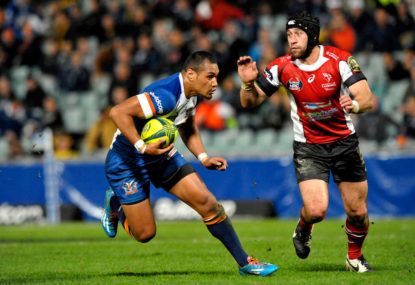J_D_J
new author
Roar Rookie

The experimental scoring system being trialled in this 2016 edition of the National Rugby Championship (NRC) provides excellent incentive for attacking rugby.
There will be better reward for tries, which will be worth six points, compared to penalty goals, worth just two points (try conversions will still be worth two points).
Penalty goals in rugby have been overvalued for too long. Laws to devalue penalty goals to two points should be introduced to all tiers of rugby worldwide, including international rugby, without further delay.
The 2015 edition of the NRC introduced two-point penalty goals and three-point conversions while keeping the value of a try at five points. That scoring system, combined with a number of other experimental law variations, resulted in the incentive to score tries and therefore play an entertaining brand of rugby.
With tries being valued at six points, teams will more often go for the line rather than the sticks.
Nothing frustrates me more than teams playing for scrum penalties in their opposition’s half. Let’s face it, rugby scrums are still a mess and referees are plucking decisions from their proverbial… hats. Teams are too often harshly penalised when a 50-50 scrum penalty goes against them and costs three points.
While we’re on the matter, let’s stop the clock between the first scrum set until the ball exits the scrum to the referee’s satisfaction. This move would prevent time wastage due to multiple scrum resets and also prevent the type of cynical, time-wasting play we see from teams near the end of close matches to shut out the other side.
Back to the NRC 2016 points system, I hope that in 2016 we continue to see plenty of tries scored like last year. Also, I am certain we will see fewer matches won by teams that score fewer tries than their opposition, like two of the matches in recent three-Test series between the Wallabies and England.
Interestingly, if you apply the NRC 2016 points system retrospectively to the three Test matches, the series result is much closer, although England would still have won. The Brisbane (36-36) and Sydney (42-42) Tests would have ended in draws and in Melbourne the score would have been 20-8 to England. The calculations for each match are below with a comparison to the NRC 2015 points system as well.
First Test, Brisbane
Tries (T) – Conversions (C) – Penalty Goals (PG)
Aus: 5-1-2
Eng: 3-3-6
Current system (5-2-3): Eng 39 – Aus 28
NRC 2015 (5-3-2): Eng 36 – Aus 32
NRC 2016 (6-2-2): Eng 36 – Aus 36
Second Test, Melbourne
T-C-PG
Aus: 1-1-0
Eng: 2-2-3
Current system (5-2-3): Eng 23 – Aus 7
NRC 2015 (5-3-2): Eng 23 – Aus 8
NRC 2016 (6-2-2): Eng 20 – Aus 8
Third Test, Sydney
T-C-PG
Aus: 5-3-3
Eng: 4-3-6
Current system (5-2-3): Eng 44 – Aus 40
NRC 2015, (5-3-2): Eng 41 – Aus 40
NRC 2016, (6-2-2): Eng 42 – Aus 42